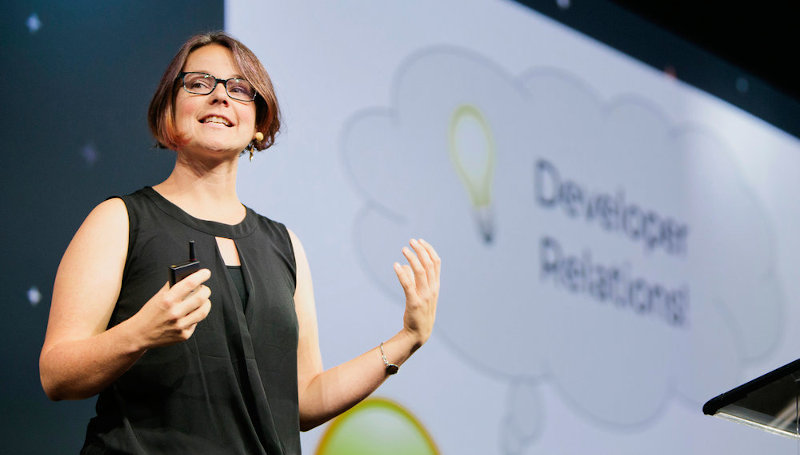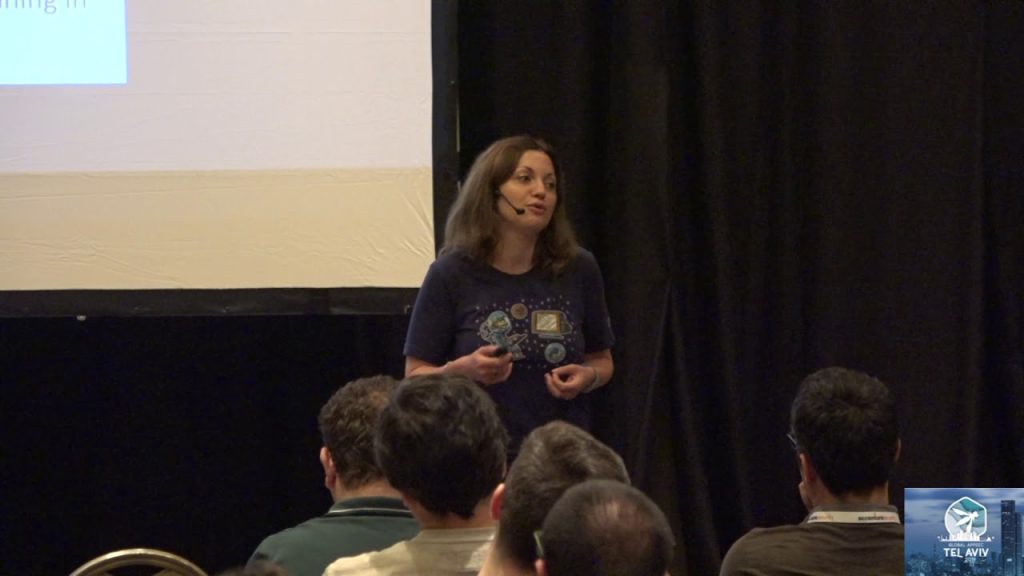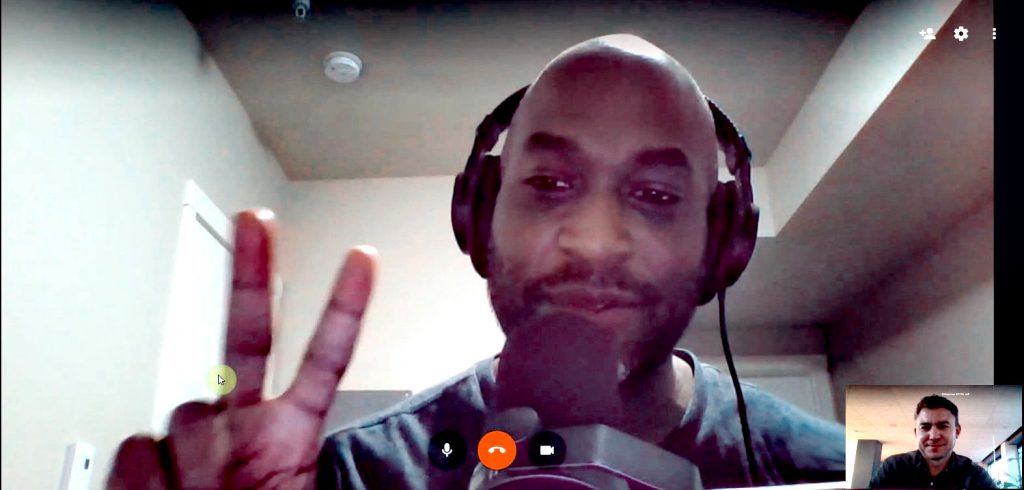If you’re interested in receiving interviews with thought leaders and a digest of exciting ideas from the world of DevOps straight to your inbox, subscribe to our 0800-DEVOPS newsletter!
###
Mary Thengvall is Director of Developer Relations at Camunda and author of the first book on Developer Relations “The Business Value of Developer Relations”. Above all she is a passionate community builder known for building community programs at O’Reilly Media, Chef Software, and SparkPost. Reading her book sparked so many good ideas that I had to talk with Mary about Developer Relations and building internal developer communities.
Here is our conversation, thanks Mary!
Ivan: Mary, can you tell us what are some of the larger communities that you have helped build?
Mary: I have a huge passion for building resources for the greater DevRel and Community industry, so I’ve built out a handful of communities and ongoing resources over the past few years:
DevRel Collective is a community that exists to facilitate sharing information, resources, and encouragement among the Developer Relations community. It started as a way for a handful of us to keep in touch with each other rather than just seeing each other on the road every few months at conferences. We wanted a place to share information and encouragement, and it’s become just that! There are now over 1,500 members and it’s a fantastic resource for those who are new to the industry as well as those of us who have many years of experience!
Community Pulse is a monthly podcast run by myself and cohosts Jason Hand, PJ Hagerty, and Sarah-Jane Morris. Jason and I started it as a way to learn more about community building and interview interesting folks in the industry and it’s turned into a great collection of discussions about various DevRel-related topics.
DevRel Weekly is a weekly newsletter that focuses on the latest tweets, podcasts, and articles published about Developer Relations topics. I sort through 800+ links every week with the help of Kate Pond and combine the top links with a summary of what’s happening in the industry.
I maintain a blog with several posts per year on the state of Developer Relations and often contribute guest content to other websites as well.
Lastly, I wrote The Business Value of Developer Relations in 2018, fueled by the desire to create the resources I wished had existed when I had started!
Ivan: You have recently joined Camunda which is a superpopular BPM platform. As a company that uses Camunda, we’re thrilled with having you on board. How do you feel about this move to Berlin?
Mary: I’m actually not moving to Berlin! I spent most of Dec 2019 and Jan 2020 there to onboard and get to know my team, but I’ll be working remotely from San Francisco. We’re in the process of building out a globally distributed team and expanding into North America is just one small part of that.
I’m incredibly excited about the opportunity to build their program from the ground up. They’ve laid a fantastic foundation of open source principles and a general understanding of the value of connecting with their community and I now have the privilege of scaling those efforts and putting processes in place that will allow the team to work even more effectively and efficiently.
Ivan: We’re usually talking about DevRel in the context of companies that develop products used by other developers. What about service-oriented companies that don’t offer products but rather professional services to their clients? Is there a space for DevRel in such companies?
Mary: I actually talk about this in my book! Felicitas Kugland is a Principal Product Engineer on the Developer Relations/Community team at Sinner Schrader, a digital agency based in Hamburg, Germany. Her goals are part awareness and part recruiting. She engages with the developer audience in her local area, as so many of us do, letting them know what services Sinner Schrader provides and how they can get more involved.
In short, I absolutely think there’s a place for Developer Relations for these companies! DevRel is all about building relationships with the technically-minded and tech-savvy folks around us. Sometimes this results in a better pipeline for sales. Other times it results in a better pipeline for recruiting. And it can always result in our company, whether we’re an API, open source, PaaS, SaaS, or an agency, being more highly regarded in our particular niche.
Ivan: After all, this is a newsletter dedicated to DevOps topics Can you tell us what connections do you see between DevRel and DevOps? Can DevRel efforts have an impact on DevOps culture in the company?
Mary: I 100% think DevRel can have an impact on DevOps culture in the company! I have a soft spot for DevOps since that was my first community that I worked with at O’Reilly Media and I worked with the Chef contingent of the community for some time as well.
I like to think of Developer Relations as the hub of the wheel — the ever-important center connection that keeps everything moving in the right direction but also serves as connection point for all of the various departments throughout the company. We’re responsible for so much of the communication because we translate the technical needs into language that the marketing and sales teams understand, and vice versa, we help our community understand the decisions the company has made.
Likewise, DevOps teams must work cross-functionally throughout the entire company, learning to listen first and creating strategy second. They must also set boundaries in order to ensure that they aren’t being overworked, which is something we also struggle with in DevRel. There are so many comparisons that can be made! I think we have much to learn from each other.

Second annual Post/Con, The Postman User Conference, at The Village in San Francisco, Calif., Thursday, Sept. 12, 2019. Photo by Alison Yin/Alison Yin Photography
Ivan: When focusing on the internal developer community, do companies still need Head of Development role today or should this role move toward Community Manager?
Mary: I’ve seen this be executed in a number of ways, but I think the most important piece is having who not only understands the value of their work but knows how to communicate it to the proper stakeholders throughout the company. If you can find a Community Manager who’s capable of doing this, GREAT! If not, then looking for a “Head of” role is probably your better bet, because you’re more likely to find someone who’s more accustomed to proving value to stakeholders.
Ivan: You have a respectable track record in building communities. What are your favorite activities in building a developer community?
Mary: My favorite part of building a developer community is the conversations that happen with the community. I love getting to know them: hearing about their needs — the issues they’re facing at work as well as in their hobbies — and then working with my colleagues to meet those needs. As we work to build the trust in those relationships, awesome things happen. The community comes together to support each other, we’re able to find interesting and new ways to support them, and we can start delivering clear value back to our company.
Ivan: What would in your opinion be good metrics for assessing the health of the internal developer community?
Mary: There are a few great metrics I’ve been focusing on lately. One is DevRel Qualified Leads, which I think can apply whether you’re building an internal or external developer community. Making connections both within the community and from the community back to the company is an essential part of what we do as a Developer Relations team.
The most successful metric that I’ve found for internal DevRel specifically is increased communication and collaboration among teammates. This could be measured in the speed with which projects get completed, the amount of feedback collected and processed, or even how the various teams feel about working cross-functionally. This increased collaboration and teamwork often leads to a better, stronger product for your community as well as a more fulfilled staff, which can result in a greater employee retention rate.
Ivan: As I said, we’re thrilled to have you in Camunda corner! Are there any exciting new things that Camunda has prepared for us in 2020 that you can share with us?
Mary: We just launched the public beta of Camunda Cloud, which is incredibly exciting! Adam Urban, one of our engineers, tweeted a fantastic thread the other day about why you should be excited about Camunda Cloud and what it means not only for Camunda customers but for the future of process automation.
Stay tuned for more exciting news about Camunda Cloud and the Zeebe engine this year, as well as more awesome releases in our Camunda BPM product as well. I’ll be MC’ing CamundaCon NYC in April and I can’t wait to connect with community members and share their excitement for what’s to come.
Ivan: Can you share with us what are you reading these days and who are the people you follow that make you think differently and do better?
Mary: I’m in the midst of reading a few different books that I’m excited about. I’m currently listening to People Powered by Jono Bacon and reading Resilient Management by Lara Hogan. On a personal level, I’m really enjoying Space by Manda Carpenter. It’s been a challenging book to work through, tackling topics like work/life balance and how to make space for things that really matter in life. I’ve also really enjoyed the podcast Without Fail from Gimlet. Host Alex Blumberg has candid conversations with leaders (many of which are household names!) about difficult decisions they’ve had to make, addressing both their successes and failures over the years.
As far as people who inspire me to think differently and do better, there are a few that I rely on to challenge me and keep me accountable in my personal and professional life, including:
- Rain Leander
- Jeremy Meiss
- David G. Simmons
- Emily Freeman
- Matt Broberg
- Bear Douglas
- Sherrie Rohde
- Swarna Podila
If you’re interested in receiving interviews with thought leaders and a digest of exciting ideas from the world of DevOps straight to your inbox, subscribe to our 0800-DEVOPS newsletter!
###


